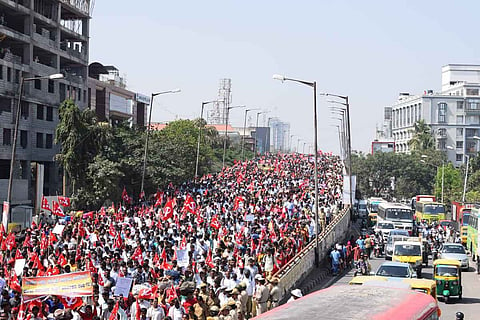

Over 3,000 workers, most of them women, marched from Bengaluru’s Anand Rao Circle to Freedom Park on Tuesday, demanding the government to implement the minimum-wage guidelines prescribed by the Supreme Court.
The protest was organised by Center of Indian Trade Unions and CPI(M). Anna Bhagya, Asha, MNREGA, Anganwadi and gram panchayat workers protested for a pay hike. They claimed that the meagre sum they receive is not enough to run their households.
Lakshmi Prabhakar, a 36-year-old resident of Sirsi, cooks for the children who study at the Sirsi Government High School. She was appointed three years ago, under the Anna Bhagya scheme. She earns Rs 1,900 per month and is the sole breadwinner of her family. She supports an unemployed husband, her mother-in-law and two children.
“This amount is not enough to buy ration and pay the electricity bill every month. And I do not have the option to work as an agricultural labourer or work for MNREGA as I have to work till 3 pm. No one is willing to hire part-time labourers. I am going to protest until action is taken,” Lakshmi said.
Another problem voiced by the protesters is that the Asha workers are overworked and underpaid. The Asha workers, all of them women, are offered incentives for every task they perform.
These workers have to identify the pregnant women in the village they work for. They have to accompany the mother to the hospital at the time of delivery and have to ensure that the mother and child are safe after that. For this, they earn Rs 300.
Besides, if the child has been taken for all vaccination appointments, these workers get paid Rs 100. They also have to make sure that every household in the village cleans their water storage tanks to avoid the spread of diseases like malaria and dengue.
“We go to the ponds and pick up the guppy fish and put them into the well as they eat the mosquito larvae. This is done to check the spread of malaria, chikungunya and dengue. We don’t get paid at all. We also have to attend taluk-level meetings five times a month and the travel expenses are not covered,” said P Parvatamma, a 29-year-old Asha worker.
“We have no medical insurance. At the end of the month, we get Rs 800-1,000 if we have excelled in performing all our tasks. Mostly, we make only Rs 450,” she added.
Parvatamma lives with her mother-in-law, Sumitramma, in Chikkaballapura’s Bagepalli. Two months ago, Sumitramma suffered from renal failure. Parvatamma had to borrow Rs 80,000 from her friends and neighbours in Bagepalli and is now struggling to repay the sum. Her husband left home five years ago and has not been heard from since.
“We want the government to give us a monthly stipend of Rs 18,000 so that we can live better lives. I have been working for Asha for seven years and I do not want to stop because I want to help people in my village. But being able to afford three meals has become so difficult,” said Pavitramma.
The gram panchayat workers, whose salary was increased to Rs 12,000 five months ago, claim that the plan has not yet been implemented.
“We receive only Rs 7,000 per month even after the announcement was made. We are the ones who work hard and yet we don’t get paid for the effort we put in. We have come along with our bags and will sleep here and live here until the government decides to take action,” Puttananjappa, a 40-year-old gram panchayat worker from Holanarasipura in Hassan district.